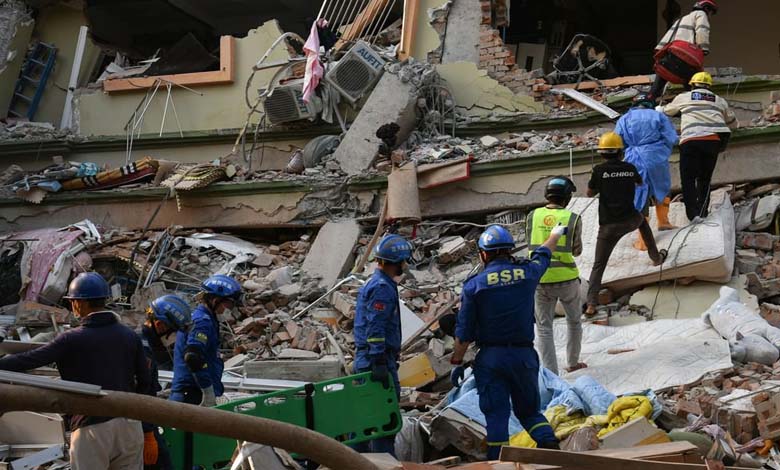World Health Organization Warns of Disease Outbreaks Following Myanmar Earthquake

The World Health Organization (WHO) has issued an urgent warning about the increased risk of infectious disease outbreaks in Myanmar following the devastating earthquake that recently struck the country. Among the most concerning threats are the potential spread of malaria, dengue fever, and viral hepatitis, as the natural disaster has caused extensive damage to water and sanitation infrastructure, leaving thousands of people without access to clean drinking water and proper hygiene facilities.
-
Myanmar: Around 20 Dead and Widespread Destruction after Earthquake
-
A 5.57-Magnitude Earthquake Strikes Seram Island in Indonesia
According to health experts, the destruction of sanitation systems and water supply networks has created a favorable environment for the rapid proliferation of disease-carrying mosquitoes and bacteria, significantly increasing the risk of vector-borne and waterborne illnesses. The WHO is particularly concerned about the situation worsening in the coming weeks if urgent health and humanitarian interventions are not swiftly implemented.
Overcrowded Hospitals and a Worsening Health Crisis
During a video press conference, Dr. Tushara Fernando, WHO representative in Myanmar, provided a detailed account of the dire conditions in the affected regions, including Naypyidaw, the country’s capital. He painted a grim picture of overwhelmed hospitals, where the sheer number of injured and sick individuals has exceeded available medical capacities.
-
Two Earthquakes Strike Ethiopia within 10 Minutes
-
Earthquake of Magnitude 5.5 Strikes China’s Qinghai Province
Dr. Fernando reported that medical supplies are critically low, and doctors and nurses are struggling to provide adequate care to all patients due to the rapid depletion of essential medicines, medical equipment, and emergency response materials. The crisis is further compounded by severe electricity shortages, with many hospitals experiencing frequent blackouts, disrupting medical treatments, surgeries, and the operation of life-saving machines.
Another major challenge facing healthcare facilities is the shortage of fuel, which has impacted not only ambulance services but also the functioning of hospital generators, which are crucial for maintaining power to critical care units and emergency rooms. Without urgent replenishment of these resources, the ability of hospitals to operate effectively will continue to deteriorate, leading to potential loss of lives due to preventable causes.
-
Ethiopia: Earthquake of Magnitude 5.5 at a Depth of 10 Kilometers
-
Violent Earthquake Strikes Vanuatu, Damaging U.S. and French Embassies
Dr. Fernando expressed deep concern that if immediate action is not taken to stabilize the healthcare situation, Myanmar could soon face a full-scale public health disaster, as the outbreak of infectious diseases could spread uncontrollably, putting thousands more people at risk.
Special Concern for Vulnerable Patients in Urgent Need of Medical Care
The WHO has also highlighted the immense difficulties faced by vulnerable groups who rely on continuous medical attention, such as:
-
4.9-Magnitude Earthquake Strikes Southern Philippine Province
-
Powerful Earthquake Hits Papua Region in Indonesia
- Pregnant women, who require prenatal care and safe delivery options, but now face reduced access to medical supervision, increasing the risk of complications for both mothers and newborns.
- Infants and children, whose developing immune systems make them particularly susceptible to infections and who are at high risk of dehydration and malnutrition due to contaminated water supplies.
- Patients with chronic and life-threatening illnesses, such as diabetes, cardiovascular diseases, and respiratory conditions, who depend on regular treatments and medication that are now scarce or completely unavailable.
For these individuals, any disruption in medical care could lead to serious health deterioration or even death. The WHO is urgently calling for international assistance to ensure that critical medicines and healthcare services reach those in need without further delays.
-
After a 5.9-magnitude earthquake, Japan warns of tsunami risk on its remote islands
-
Magnitude 5 earthquake hits southern Turkey
Assessing the Damage to Medical Facilities and Hospitals
As part of its ongoing response efforts, the WHO is currently conducting a full-scale assessment of the damage sustained by hospitals and medical facilities. Initial findings have revealed that three major hospitals suffered severe structural damage, leaving them partially or completely inoperative. Additionally, 22 other healthcare institutions have sustained partial damage but continue to provide emergency medical care to patients with serious injuries.
However, working under such extreme conditions poses enormous challenges for medical staff, who are overworked and under-resourced. Many hospitals are operating without sufficient supplies of clean water, antibiotics, surgical tools, and sterile equipment, further complicating efforts to provide safe and effective medical care.
-
In a Geological First… Iraq Records 18 Earthquakes in One Month
-
6.9-Magnitude Earthquake Hits “Tonga” as Guterres Attends Regional Summit
To mitigate the impact of these shortages, the WHO is coordinating emergency relief efforts to deliver medical supplies and humanitarian aid to affected regions as quickly as possible.
WHO’s Emergency Medical Aid and Humanitarian Assistance
In response to the escalating crisis, the WHO has already taken swift action to provide lifesaving medical assistance to hospitals in the hardest-hit areas. Three tons of essential medical supplies have been delivered to hospitals in Mandalay and Naypyidaw, ensuring that emergency healthcare services could continue within 24 hours of the earthquake.
-
Earthquake of 5.9 Magnitude Strikes Ishikawa, Japan
-
5.0 Magnitude Earthquake Strikes Sichuan Province in China
The initial shipment included:
- Antibiotics and antiviral medications, to help treat bacterial and viral infections.
- Intravenous fluids and rehydration solutions, crucial for treating dehydration caused by diarrheal diseases.
- Medical kits for emergency surgeries and wound care, to support doctors performing life-saving procedures.
- Personal protective equipment (PPE), including gloves, masks, and gowns, to prevent the spread of infections among healthcare workers and patients.
Dr. Fernando also confirmed that a second shipment of medical supplies is currently being prepared, with additional medical aid expected to arrive within the next few days to further support struggling healthcare centers.
-
3.2 Magnitude Earthquake Strikes the City of Chlef, Algeria
-
Two earthquakes hit Iran in less than 24 hours
Urgent Call for International Support and Long-Term Recovery Efforts
Given the scale of the disaster and the magnitude of health risks, the WHO is urging governments, humanitarian organizations, and international donors to step up their assistance to Myanmar. The organization has outlined several key priorities that require immediate action to prevent a worsening crisis:
- Restoring access to clean water and sanitation facilities to prevent the outbreak of waterborne diseases.
- Deploying mobile medical teams to provide urgent care in areas where hospitals are inoperable or overburdened.
- Increasing the supply of essential medicines, vaccines, and medical equipment to prevent shortages that could endanger lives.
- Rebuilding and repairing damaged healthcare infrastructure to ensure long-term recovery and resilience.
- Providing logistical support for transporting relief supplies and fuel to affected areas without delays.
-
Turkey: 5.6 magnitude earthquake shakes Tokat region
-
4.8-Magnitude Earthquake Strikes New York and New Jersey
The humanitarian situation in Myanmar remains extremely fragile, and time is of the essence. Without rapid intervention, the aftermath of the earthquake could spiral into a severe health emergency, with thousands of people left without medical assistance, clean water, or basic necessities.
Dr. Fernando concluded by emphasizing the need for solidarity and immediate action, stating that every minute counts in the fight to save lives and prevent a catastrophic public health crisis in Myanmar.
-
Earthquake Strikes the Egyptian City of Luxor… What was its magnitude?
-
House-shaking… 7-magnitude earthquake hits the China-Kyrgyzstan border
-
Japan Earthquake: Death toll rises to 200












